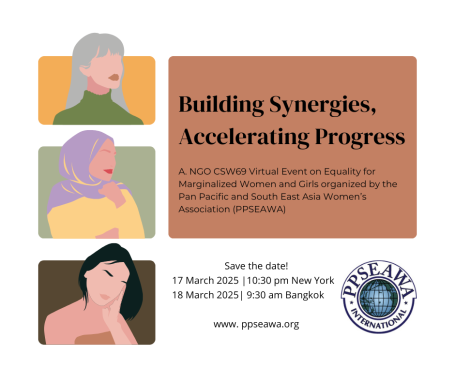
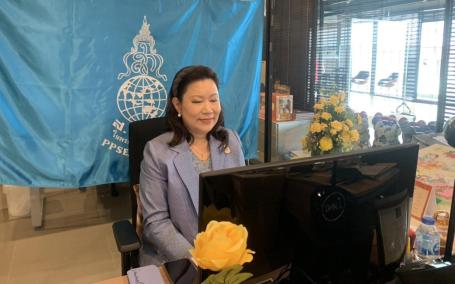
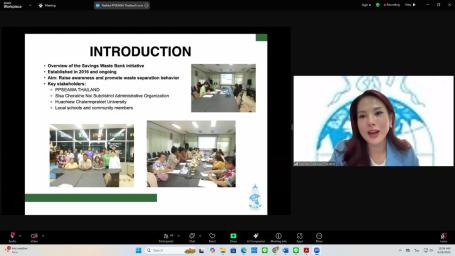
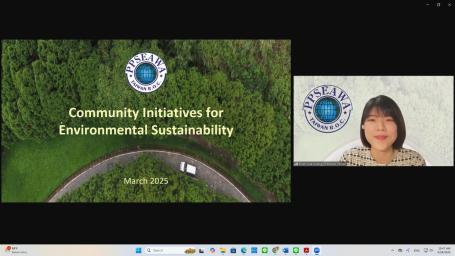
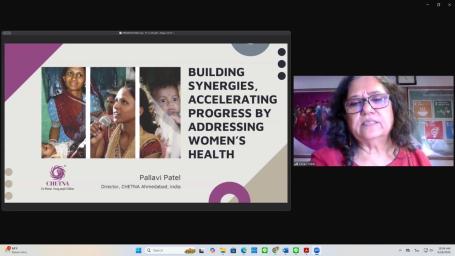
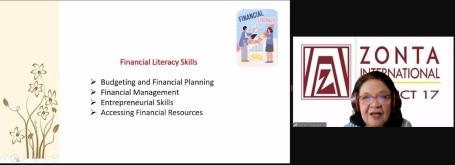
The sixty-ninth session of the Commission on the Status of Women took place at the United Nations headquarters in New York from 10 to 21 March 2025. The main focus of the sixty-ninth session was the review and appraisal of the implementation of the Beijing Declaration and Platform for Action and the outcomes of the 23rd special session of the General Assembly. The Beijing Platform for Action aimed to create a peaceful, just, and humane world based on human rights and fundamental freedoms 30 years ago. Yet, marginalized women and girls often are victims of specific forms of violence and harmful practices.
PPSEAWA International organized a CSW69 Parallel Event: “Building Synergies, Accelerating Progress: Equality for Marginalized Women and Girls” on 17 March 2025, to highlight the best practices of women-led initiatives to overcome barriers, build synergies, and accelerate progress in a few of the twelve critical areas of concern: education, health care, social protection, and livelihood skills training from the perspectives of several Asia Pacific countries including India, Lebanon, Malaysia, Philippines, Taiwan, Thailand.
Part One - Women-Led Empowerment
Welcome by Dr. Raj Abdul Karim, Second Vice President, PPSEAWA International
Part Two - Empowerment of women in vulnerable circumstances
Hoda Kara, President/Founder, Sawa Without Borders Associaton, Lebanon.
“Vulnerable Children and Women in Lebanon”.
Sawa Without Borders Association is a Lebanese non-governmental organization officially established in October 2024. Its mission is to address the needs of vulnerable children and families who face severe hardships resulting from various challenges, such as social and economic crises, armed conflicts, natural disasters, displacement, and forced migration. It supports those who are in conflict with the law. By protecting human rights and fostering their well-being through medical care, quality education, and social welfare programs, the association strives to help in creating a better future, where every individual, regardless of their background or circumstances, can enjoy dignity and an improved, better quality of life. Previously, she was the Executive Director of Dar Al Amal from 1996-2023. This Lebanese NGO operates prevention and protection centers for children at risk, from displaced families as well as street and working children). They also ran a special rehabilitation center and reintegration center for girl survivors of violence and prostitution.
Brittocia Franklin, Executive Director, Global Shepherds, Malaysia
“Looking Beyond the Shattered Pieces”.
Global Shepherds is a not-for-profit organization that aims to strengthen safe guarding systems for women and children by improving access to basic rights, services and information through direct interventions, outreach, capacity building, research and advocacy and continuously promotes the use of trauma informed and victim-centered approach when working with victims of trafficking. Most women and girls who come there are in varying degrees of trauma, some bearing visible scars and disabilities, while nearly all carry deep psychological and emotional wounds. The six key principles of trauma-informed care are: Safety, Trustworthiness & Transparency, Peer support, Collaboration & mutuality, empowerment, voice & choice, Culture, historical and gender sensibility.
Chavali Pamela Osathanugrah, President, PPSEAWA Thailand and he former Governor of Zonta International District 17.
“Hygiene Street Food Program in Creating Opportunities for and Empowering Former Women Prisoners”
PPSEAWA Thailand aims to provide self-employment opportunities through tangible, vocational assistance for women who are former inmates of prisons in the Bangkok metropolitan area. The women undergo four months of on-the-job training tailored to their individual needs. PPSEAWA participates at three stages: selection of candidates, financial support for women to start their own businesses in street food vending, and follow-up services including counselling and financial literacy training for managing the businesses. The project received from the Ministry of Jus<ce and the Dept. of Corrections an award of Certificate of Appreciation to PPSEAWA Thailand for their support and contribution to the mission of rehabilitating and developing the behavior of inmates, more commonly known as those who “took a wrong step”.
Part Three - Women at the Intersection of Environmental and Financial Literacy Women are severely at risk of poverty and displacement due to climate change impacts.
The third panel brings together women-led organizations to share their capacity-building and skills-training programs in different countries for inclusive, environmentally sustainable economic empowerment.
- Moderator: Akari Yamada, First Vice President, PPSEAWA International
Sonia Tiong-Aquino, Co-Chair District 17 Leaders Institute, Zonta International District 17 (Philippines).
“Investing in Her, Investing in Earth: Women at the Intersection”.
Empowering women with both environmental and financial knowledge creates a ripple effect, benefitting families and communities for generations. In the Philippines, Zonta offered skills training in three rural communities. They also offer entrepreneurship training programs for trafficked women through the shelter operated the Voice of Free Foundation. They train housewives on financial budgeting and routine savings. They teach indigenous women weavers how to use bank for the individual and association’s earrings.
She had three solutions for engaging women beyond just a one-time training: 1) invest in girls’ and women’s training for STEM, environmental science, and finance; 2) provide access to financial resources tailored to individual woman’s needs; and 3) support women’s leadership in environmental and financial decision-making processes. Involving women in the design and implementation of programs to ensure their relevance and effectiveness over the long term.
Her motto is “Let’s invest in her and enter investment in our planet’s future.”
Nattika Ho, Vice Chair of the Advancing the Status of Women Committee, PPSEAWA Thailand
“Recycle Waste Bank Project of PPSEAWA Thailand”
The project started in April 2016 and is managed by the sub-district administrative organization and university. She is the former Chair of the Environmental Preservation and Conservation Committee of PPSEWA Thailand. Driven by a deep commitment to protecting the environment. She has actively engaged in environmental policies and sustainability initiatives. She pioneered the “Trash Saving Bank Project” in Crocodie Head Province, collaborating closely with local villagers to promote waste reduction and recycling. The project has been highly successful and continues to expand to other provincesThe project held community educating forums involved with elderly, students, and residents. The management overseen by the Savings waste Bank Committee. The members deposit recyclable waste and earn dividends which add 20% to their savings. By 2018, the project launched “Power of Change: Waste Separation for Savings” initiative which expended to Wat Hua Khu School students and scholarships were awarded based on waste deposits. Also in 2018, the project established “Savings Waste Bank Learning Center”. It’s a study site for environmental management which help improve community cleanliness and reduced waste in canal. The project was selected as a pilot for ThaiHealth’s Sustainable Waste Management Project.
Shao Hua Huang, Youth Representative to PPSEAWA International (Taiwan) co-founder of WEroom, which promotes female self-identity and breast health through art workshops.
“Community Initiatives for Environmental Sustainability”
“There are only misplaced resources, no waste!” One project supports UN Goal for sustainable cities. They set up a thermal composter in a public park to collect coffee grounds for reuse by mixing with wood chips and fallen leaves to generate soil amendments, which are then used by the residents. They encouraged coffee shops to use the public composter to create less waste. The project also engaged school children by providing them with environmental education within their communities.
“When women lead, communities flourish.” PPSEAWA Taiwan also has a Young Woman’s Fund to empower young leaders through environmental initiatives. sponsored programs such as: 1) Empower rural women through sustainable living practices turning agricultural waste into economic opportunity. 2) “Clever Women’s Weaving Crafts Studio” which provide safe inclusive spaces for women to network and collaborate with the guidance of art. 3) Ocean Protection Pledge to Incorporate strategies in our daily lives that protect the ocean like to reduce the usage of single-use plastic, avoid eating protected species and use marine resources sparingly, prevent ocean acidification by saving energy and reducing carbon dioxide emissions. PPSEAWA Taiwan conducts beach cleanup days regularly with the members. 4) Planting trees around the International Earth Day
Ms. Pallavi Patel, Director, CHETNA (India).
“Building Synergies, Accelerating Progress by Addressing Women’s Health”
A strong advocate for women’s empowerment, Ms. Patel has worked extensively to integrate gender equality into health and nutrition interventions, ensuring that women and girls have access to information, services, and opportunities to lead healthier and more empowered lives. Chetna’s commitment to human capital and facing two challenges of poor health and poor incomes. CHETNA’s strategic approach is gender and rights- based interventions.
Ms. Patel’s advice is to design the program aligned with the government agenda to mainstream the strategies and approaches. CHETNA has been working to bridge gaps between people and healthcare, with a focus on maternal and child health, immunization, and health promotion:
- CHETNA convinced women to call ambulance service to go deliver their babies and increased the institutional delivery rate from 45% to 81% during 2006-2009.
- CHETNA is the first NGO to develop health communication materials on anemia in 1996, 51% anemic women returned to normal category and non-remained severely anemic.
- CHETNA has worked 30 plus years on menstrual health awareness and improve menstrual hygiene product usage from 20% to 77%.
- CHETNA held 500+ educational fairs for mothers and daughters. Contraceptive uptake in intervention area increased from 30% to 70% in a period of 3 years.
- CHETNA have started daycare center to support women get into workforce.
We thank our co-sponsors: CHETNA, Global Shepherds, International Federation of Business and Professional Women, Zonta International, PPSEAWA Malaysia, PPSEAWA Taiwan, PPSEAWA Thailand, and PPSEAWA USA.
